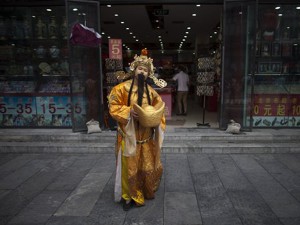China’s trade growth weakens amid economic slump

A souvenir shop employee dressed up as the Chinese God of Fortune holds a paper-made gold ingot in front of the shop to attract customers on a shopping street in central Beijing, China, Monday, July 9, 2012. China's inflation fell to a 29-month low in June, giving Beijing more room to fight a deepening economic slowdown. (AP Photo/Alexander F. Yuan)
BEIJING — China’s trade growth decelerated sharply in June as a slowdown in the world’s second-largest economy deepened despite stimulus efforts.
Import growth fell by half from May’s level to 6.3 percent, data showed Tuesday, reflecting weak Chinese consumer and industrial demand. Export growth declined to 11.3 percent from May’s 15.3 percent amid weakness in China’s key European and U.S. markets.
China’s slowing demand for oil, iron ore and other foreign goods is bad news for economies that had been looking to relatively strong Chinese growth to help drive global sales.
“The import slowdown was greater than expected,” said Moody’s Analytics economist Alaistair Chan in a report. As for foreign demand, “it is increasingly clear that exports will not be much of a boost to China’s economy for some time.”
China’s economic growth has fallen to its lowest level since the 2008 global crisis due to anemic demand for exports and government efforts to cool overheating and inflation.
Premier Wen Jiabao warned last weekend the economy faces further pressure to slow, suggesting Beijing might be considering more stimulus. It has reduced gasoline prices and is pumping money into the economy through spending on building low-cost housing, airports and other public works.
Economic growth fell to 8.1 percent in the first quarter and data due out later this week are expected to show it fell as low as 7.3 percent in the second quarter. Analysts expect a rebound later this year.
The communist government has set an official target of increasing trade by 10 percent this year but private sector analysts say growth could be as low as zero.
June exports totaled $180.2 billion while imports were $148.5 billion. The country’s diplomatically sensitive global trade surplus widened by 43 percent over a year ago to $31.7 billion, the highest level so far this year.
China’s trade surplus with the 27-nation European Union, its biggest trading partner, was even with a year earlier at $12.8 billion. The surplus with the United States widened by 8 percent to $20.7 billion.
The Chinese government spent two years tightening lending and investment curbs to steer rapid economic growth to a more sustainable level. It reversed course last year after global demand plunged but is moving cautiously, trying to avoid a repeat of China’s experience after the 2008 crisis, when a huge stimulus helped the country rebound quickly but fueled inflation and a wasteful building boom.
The government has promised to have state-owned banks lend more to the private sector but says it will keep in place controls meant to prevent new lending from fueling stock and real estate speculation. In last weekend’s comments, Wen ordered local officials to enforce controls imposed on real estate purchases to cool surging housing costs and said people caught trying to evade them would be punished.